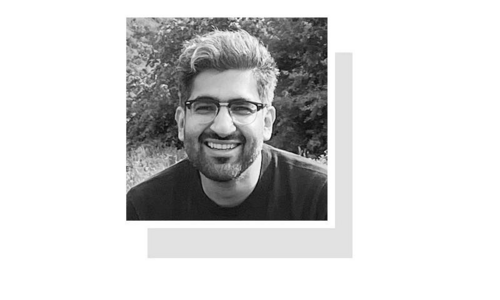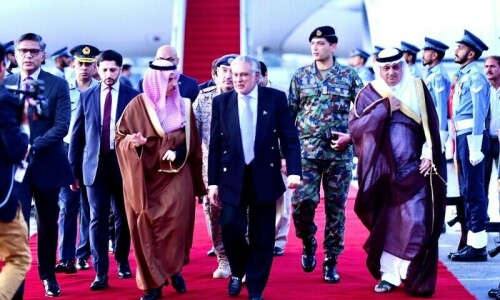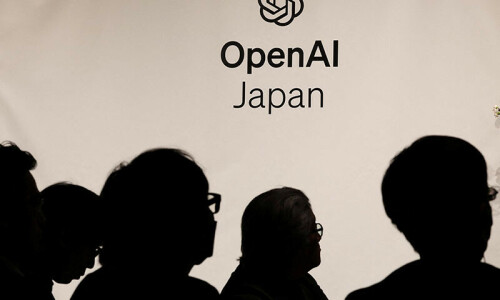THE recent visit of the foreign ministers of Saudi Arabia and its acolyte the United Arab Emirates could not have been without purpose. Neither of them wastes aviation fuel without reason.
The ostensible objective of their sudden, unscheduled visit was, according to Pakistan officials, an endorsement of Pakistan’s principled stand regarding the atrocities being committed by India in occupied Jammu & Kashmir. This might well be true, except that the final statement issued by the Arab diplomats had the aftertaste of a blancmange — bland, without bite.
By comparison, the Chinese foreign minister’s support was tart and sharply moulded. He emphasised the need for adherence by both India and Pakistan to the UN Charter, the relevant UNSC resolutions, and the sanctity of bilateral agreements. For the Chinese, continuity is everything. To the Indians, the past exists beyond a closed door, the key to which they throw away.
Did the visit of the Arab foreign ministers have a darker, deeper purpose? Was the visit to persuade our government to swallow someone else’s pride, to recognise our theocratic sibling — the state of Israel, younger to us by a year?
Did the visit of the Arab FMs have a darker purpose?
Official circles have denied that there was any discussion on Israel. Understandably, until we do recognise Israel, that has to be the official line. Unofficially, though, there has always been contact between Pakistan and Israel. In 1947, the Quaid-i-Azam received a secret message from David Ben Gurion (later the first prime minister of Israel), seeking Pakistan’s support for the recognition of Israel after its independence.
Desultory contact continued until 2005 when, at president Pervez Musharraf’s behest, Pakistan’s foreign minister Mr Khurshid Kasuri met his Israeli counterpart Silvan Shalom one moonlit night over dinner on the roof of the Topkapi Palace in Istanbul. Such a tryst could have led to something more lasting, had Musharraf not spoiled the dulcet atmosphere by insisting upon the prenuptial condition that Pakistan would recognise Israel only after reciprocal recognition of the state of Palestine.
Recently, an Israeli commentator, Prof Efraim Inbar, writing in the Israeli paper Haaretz reminded us that “in 1991, the United States convened the Madrid peace conference, all Arab states accepted the invitation and agreed to sit with the Israeli delegation, signalling a greater acceptance of Israel in a US-dominated world. Egypt and Jordan signed peace treaties with Israel. The 1993 Oslo Accords between Israel and the PLO reinforced this trend of political realism.”
Ayesha Siddiqa (the bête noire of the establishment) writing in the same Israeli paper, commented that “confronted by a larger enemy in India, Pakistan’s military is fascinated, more than its civilians, by Israel’s capacity to keep its larger Arab neighbours at bay. Many in the security community have spoken about the dividends of recognising Israel. It could earn Islamabad some brownie points in the United States, especially in the eyes of those American Jews who are believed to be a powerful lobby.”
Pakistan is over-familiar with the big neighbour syndrome. It has watched India collaborate with Israel in tactical assistance, military know-how and intelligence sharing. The suspicion of Israeli covert intervention against Pakistan reached its apogee when, in February 2019, in a briefing given by the DG ISPR following the aerial spat between the PAF and IAF, a reference was made to two Indian pilots being downed and captured by Pakistani aces. One was later identified and confirmed as Indian; the second disappeared like invisible ink from the brief issued to the press.
This led to all sorts of speculation: was the second pilot Israeli? Had he been in Indian uniform and detected only when his ID papers were found to be fake? Was he still a ‘guest’ of the Pakistani establishment? If that is true, and as we do not recognise Israel, such a situation would be a unique, intractable diplomatic conundrum.
Going back into history, our non-recognition of Israel had been in imitation of the Saudis and, it is said, at their request. They asked; we obliged. We never examined the issue through the prism of our own national interest. Today, there is an un-denied rumour that both Saudi Arabia and the UAE have agreed to recognise Israel. Should they do so, that would leave us flying our flag of principle without the support of their mast.
Should Pakistan again imitate our Saudi brethren and recognise Israel, it should not expect a change in Indo-Israeli tactics. India will always be Israel’s preferred ally in the region, especially after Prime Minister Modi described it as a ‘strategic partnership.’
There will undoubtedly be many hirsute naysayers in Pakistan political circles who will decry any move by the government towards a formal recognition of Israel. Time is against them. Their prejudice is no more than a flaccid flagpole.
The writer is an author.
Published in Dawn, September 12th, 2019










































